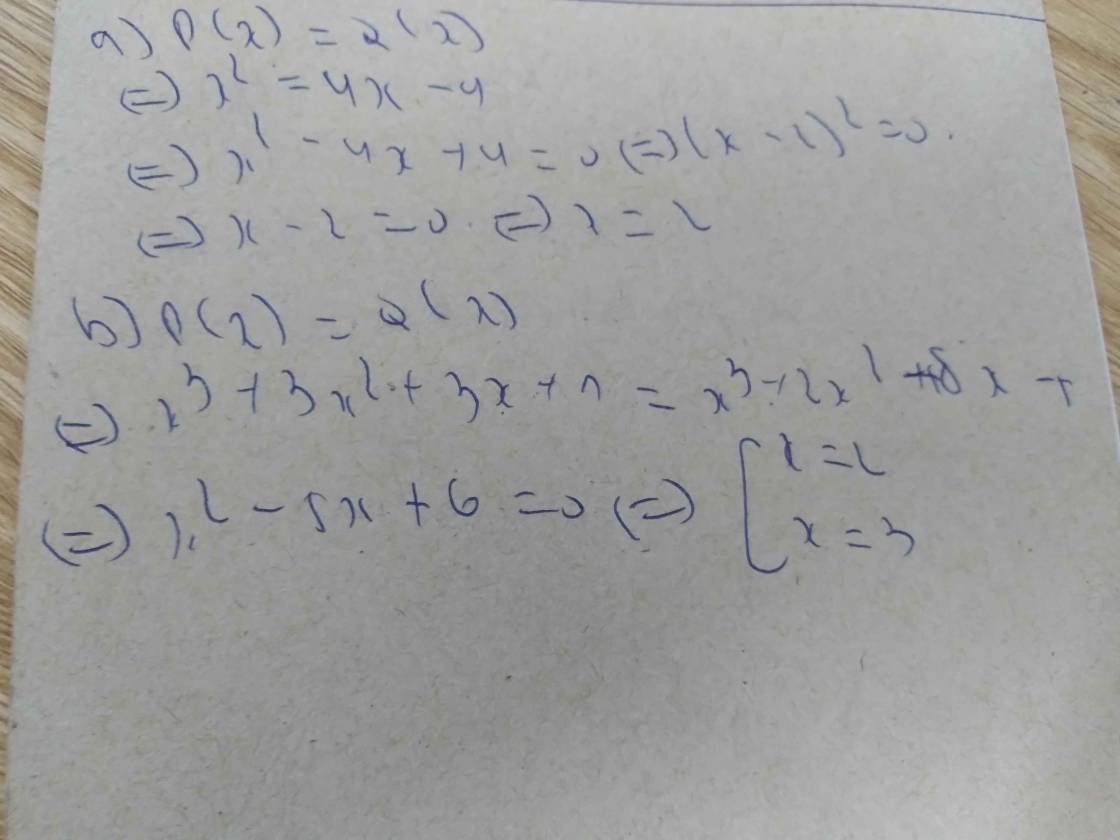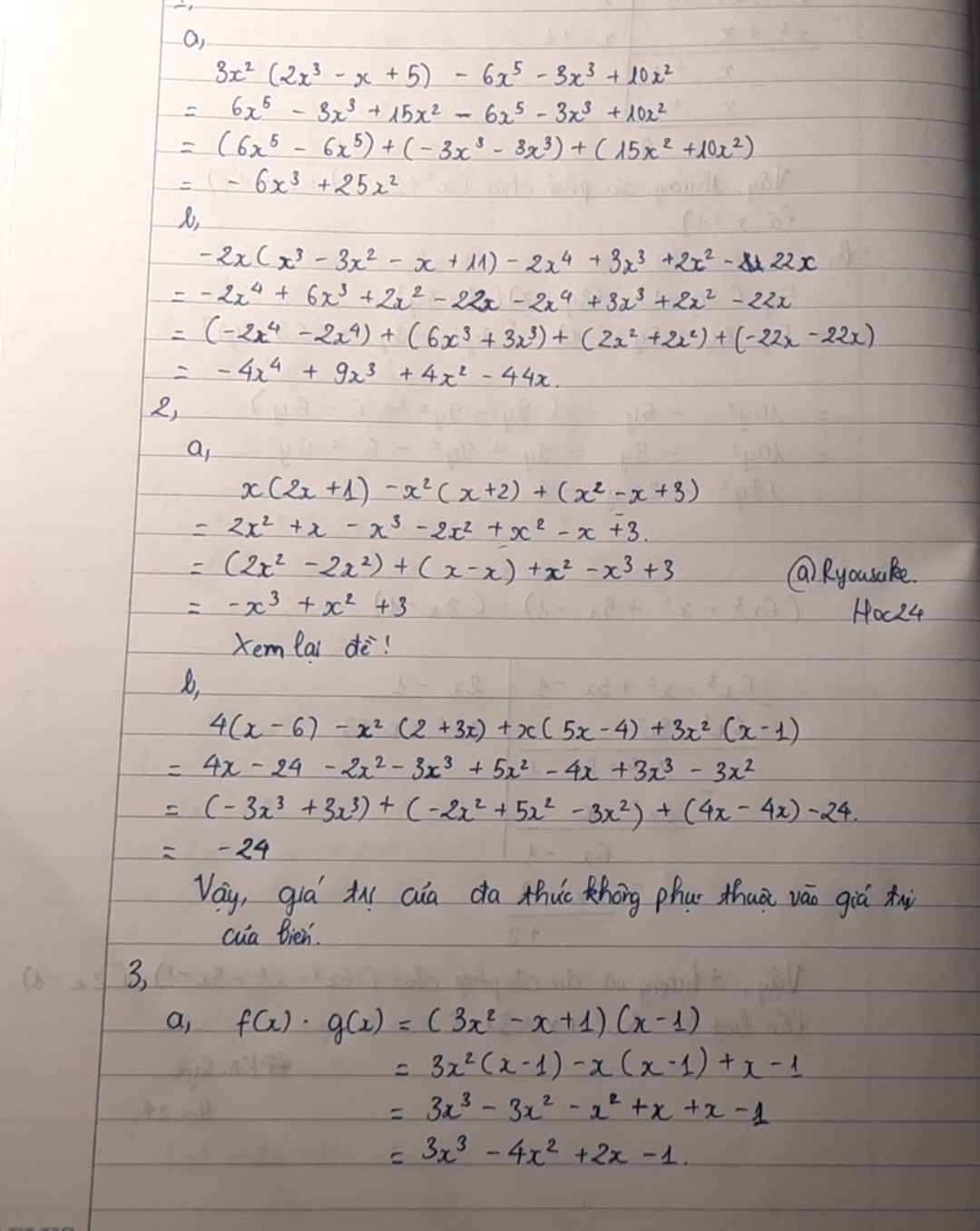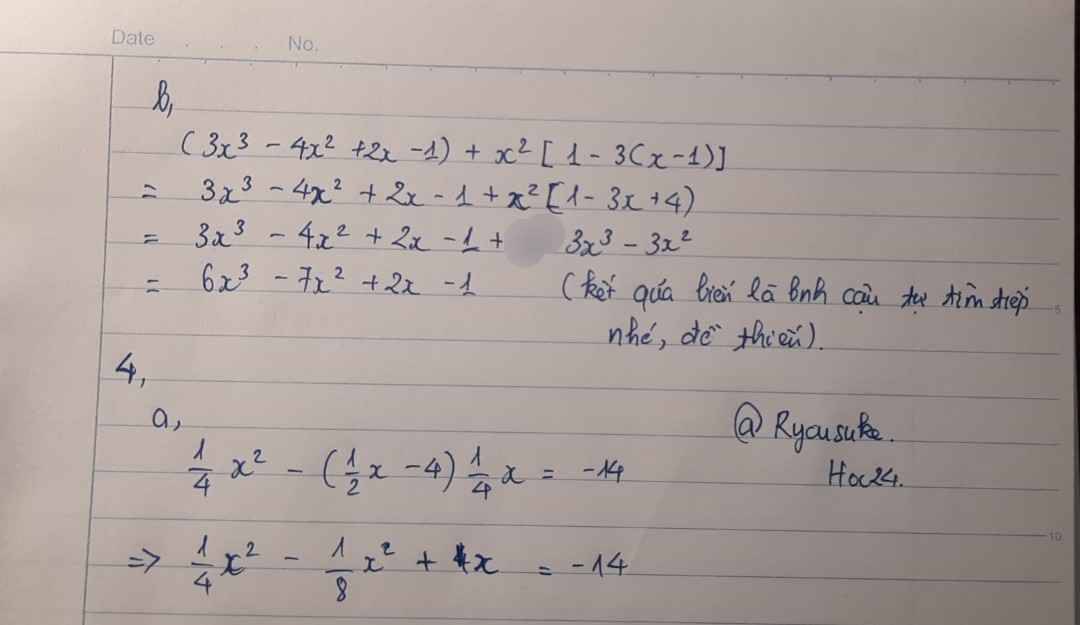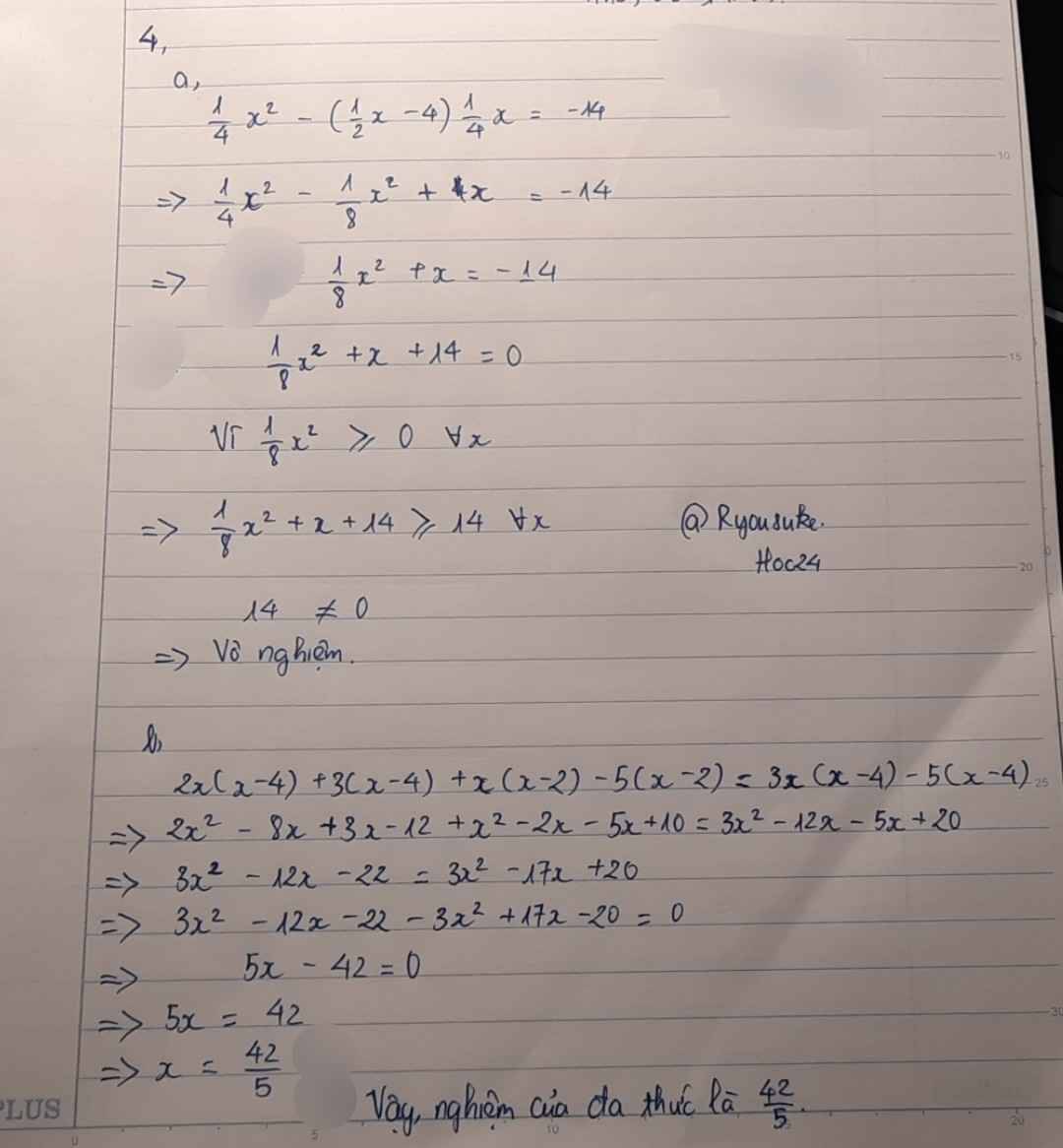cho 2 đa thức P(x)=3x2-3x+5;Q(x)=-2x2+5x-6.Tính P(x)+Q(x)
Hãy nhập câu hỏi của bạn vào đây, nếu là tài khoản VIP, bạn sẽ được ưu tiên trả lời.


1:
a: M=4/9x^2y^2*4x^2y^2=16/9x^4y^4
b: bậc là 8
hệ số là 16/9

Bài 1:
a) \(3x^2\left(2x^3-x+5\right)-6x^5-3x^3+10x^2\)
\(=6x^5-3x^3+10x^2-6x^5-3x^3+10x^2\)
\(=10x^2+10x^2\)
\(=20x^2\)
b) \(-2x\left(x^3-3x^2-x+11\right)-2x^4+3x^3+2x^2-22x\)
\(=-2x^4+6x^3+2x^2-22x-2x^4+3x^3+2x^2-22x\)
\(=-4x^4+9x^3+4x^2-44x\)

`P(x)=\(4x^2+x^3-2x+3-x-x^3+3x-2x^2\)
`= (x^3-x^3)+(4x^2-2x^2)+(-2x-x+3x)+3`
`= 2x^2+3`
`Q(x)=`\(3x^2-3x+2-x^3+2x-x^2\)
`= -x^3+(3x^2-x^2)+(-3x+2x)+2`
`= -x^3+2x^2-x+2`
`P(x)-Q(x)-R(x)=0`
`-> P(X)-Q(x)=R(x)`
`-> R(x)=P(x)-Q(x)`
`-> R(x)=(2x^2+3)-(-x^3+2x^2-x+2)`
`-> R(x)=2x^2+3+x^3-2x^2+x-2`
`= x^3+(2x^2-2x^2)+x+(3-2)`
`= x^3+x+1`
`@`\(\text{dn inactive.}\)
a: P(x)-Q(x)-R(x)=0
=>R(x)=P(x)-Q(x)
=2x^2+3+x^3-2x^2+x-2
=x^3+x+1

c. Ta có f(x) + g(x)
=(x3 - 2x2 + 2x - 5) + (-x3 + 3x2 - 2x + 4) = x2 - 1
Ta có x2 - 1 = 0 ⇒ x2 = 1 ⇒ x = 1,x = -1
Vậy nghiệm của đa thức h(x) là x = ±1 (1 điểm)

Thu gọn Q(x) = x4 + 7x2 + 1
Khi đó R(x) = Q(x) - P(x) = 4x2 + 3x + 2. Chọn A

b. Ta có f(x) + 2g(x)
= x3 - 2x2 + 2x- 5 + 2(-x3 + 3x2 - 2x + 4)
= x3 - 2x2 + 2x - 5 + (-2x3) + 6x2 - 4x + 8
=-x3 + 4x2 - 2x + 3 (0.5 điểm)
2f(x) - g(x) = x3 - 2x2 + 2x- 5 - 2(-x3+ 3x2 - 2x + 4)
= x3 - 2x2 + 2x - 5 + 2x3 - 6x2 + 4x - 8
= 3x3 - 8x2 + 6x - 13 (0.5 điểm)

a)\(f\left(x\right)=2x^2-x-3+5=\left(x+1\right)\left(2x-3\right)+5\)
Để \(f\left(x\right)⋮g\left(x\right)\Leftrightarrow\left(x+1\right)\left(2x-3\right)+5⋮\left(x+1\right)\)
\(\Leftrightarrow5⋮\left(x+1\right)\)
mà \(x+1\in Z\Rightarrow x+1\in U\left(5\right)=\left\{-1;1;5;-5\right\}\)
\(\Leftrightarrow x\in\left\{-2;0;4;-6\right\}\)
Vậy...
b) \(f\left(x\right)=3x^2-4x+6=\left(3x^2-4x+1\right)+5=\left(3x-1\right)\left(x-1\right)+5\)
Để \(f\left(x\right)⋮g\left(x\right)\Leftrightarrow\left(3x-1\right)\left(x-1\right)+5⋮\left(3x-1\right)\)
\(\Leftrightarrow5⋮\left(3x-1\right)\) mà \(3x-1\in Z\Rightarrow3x-1\in U\left(5\right)=\left\{-1;1;5;-5\right\}\)
\(\Leftrightarrow x\in\left\{0;\dfrac{2}{3};2;-\dfrac{4}{3}\right\}\) mà x nguyên\(\Rightarrow x\in\left\{0;2\right\}\)
Vậy...
c)\(f\left(x\right)=\left(-2x^3-7x^2-5x+2\right)+3\)\(=\left(-2x^3-4x^2-3x^2-6x+x+2\right)+3\)\(=\left[-2x^2\left(x+2\right)-3x\left(x+2\right)+\left(x+2\right)\right]+3\)
\(=\left(x+2\right)\left(-2x^2-3x+1\right)+3\)
Làm tương tự như trên \(\Rightarrow x+2\inƯ\left(3\right)=\left\{-3;-1;1;3\right\}\)
\(\Leftrightarrow x\in\left\{-5;-3;-1;1\right\}\)
Vậy...
d)\(f\left(x\right)=x^3-3x^2-4x+3=x\left(x^2-3x-4\right)+3=x\left(x+1\right)\left(x-4\right)+3\)
Làm tương tự như trên \(\Rightarrow x+1\inƯ\left(3\right)=\left\{-3;-1;1;3\right\}\)
\(\Rightarrow x\in\left\{-4;-2;0;2\right\}\)
Vậy...

a. Ta có:
f(x) = x3 - 3x2 + 2x - 5 + x2 = x3 -2x2 + 2x- 5
Bậc của đa thức f(x) là 3 (0.5 điểm)
g(x) = -x3 - 5x + 3x2 + 3x + 4 = -x3 + 3x2 - 2x + 4
Bậc của đa thức g(x) là 3 (0.5 điểm)




\(P\left(x\right)+Q\left(x\right)=3x^2-3x+5-2x^2+5x-6\\ =\left(3x^2-2x^2\right)+\left(5x-3x\right)+\left(5-6\right)\\ =x^2+2x-1\)